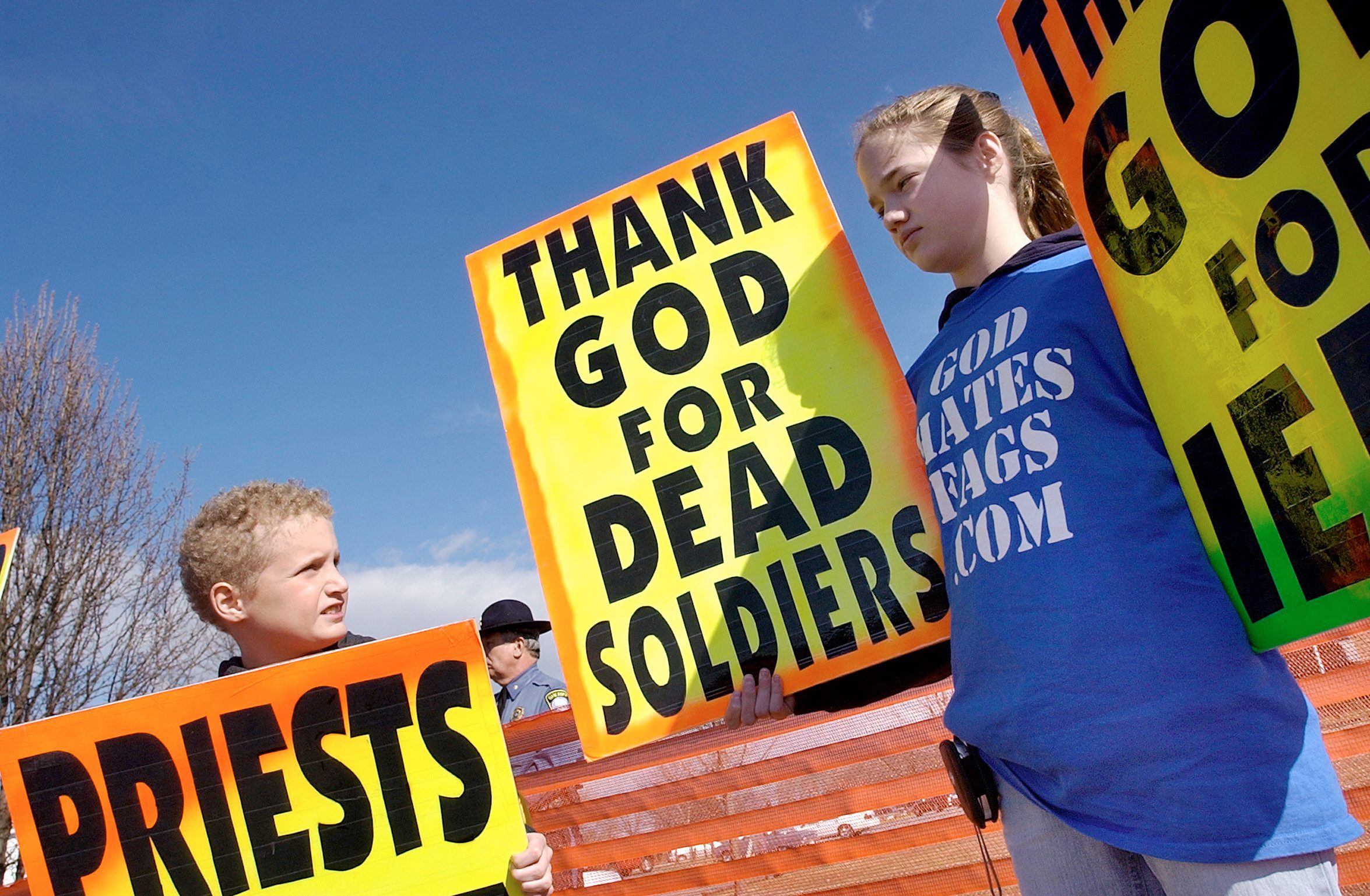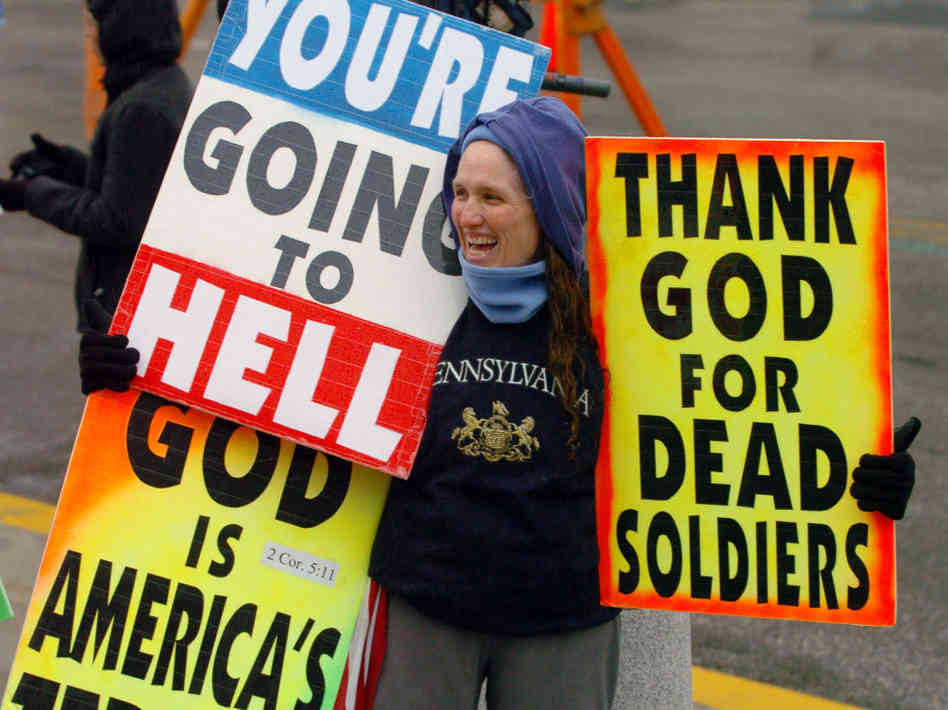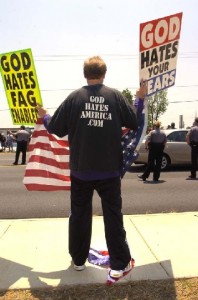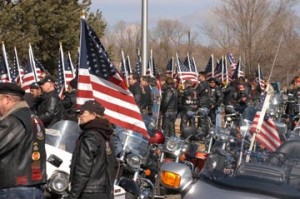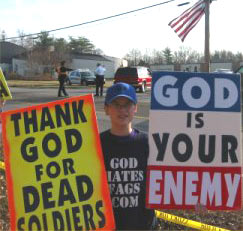Supreme Court Rules First Amendment Protects Westboro Church’s Right to Picket Funerals
Robert Barnes, The Washington Post (March 02, 2011)
A nearly unanimous Supreme Court ruled Wednesday that the First Amendment protects even hurtful speech about public issues and upheld the right of a fringe church to protest near military funerals.
Justices Rule for Protesters at Military Funerals
Adam Liptak, The New York Times (March 02, 2011)
The First Amendment protects hateful protests at military funerals, the Supreme Court ruled on Wednesday in an 8-1 decision.
Supreme Court of the United States
Snyder v. Phelps decision
For people who read United States Supreme Court decisions, the most important thing to do with any new ruling is immediately flip to the second or third page and look for the verdict. Then you can go back and and actually digest the text.
So, without much further ado, here is what the Supreme Court said about the Westboro Baptist Church (WBC) and its funeral protests:
Held: The First Amendment shields Westboro from tort liability for its picketing in this case.
We’ve been following the Westboro Baptist Church case here on the Death Reference Desk and you can read all of that coverage here.
In brief, the Westboro Baptist Church, which is based in Topeka, Kansas was sued by Albert Snyder after its members protested outside his son’s military funeral in Maryland. This was in 2006. Snyder’s son was a US Marine and the WBC, led by Fred Phelps and his daughter Shirley, appeared with signs which proclaimed “Thank God for Dead Soldiers” and other, similar statements. The WBC is also known as the group God Hates Fags and fervently believes that soldiers are dying in Iraq and Afghanistan because America has embraced homosexuality. God is showing his displeasure with America by letting the deaths happen.
The case worked its way up and down the US Court system after Albert Snyder won an earlier case and was awarded millions of dollars in damages. Last October, the Supreme Court heard arguments from both sides.
I’m not surprised that the Supreme Court decided in the WBC’s favor, since the entire case was a classic First Amendment debate. I also understand the logic which the eight justices in the majority used, even if the majority decision written by Chief Justice John Roberts seems a bit forced. By this, I mean, that the Justices could have simply said that the WBC protests were allowed to be obnoxious and ridiculous because the First Amendment guaranteed that right.
Instead, the decision uses an array of legal points which really reach reach reach for legal justifications.
Ok. That’s a little unfair.
Adam Liptak, of the New York Times summarises:
Chief Justice Roberts wrote in the ruling that three factors required a ruling in favor of the church group. First, he said, its speech was on matters of public concern. While the messages on the signs carried by its members “may fall short of refined commentary,” the chief justice wrote, “the issues they highlight — the political and moral conduct of the United States and its citizens, the fate of our nation, homosexuality in the military and scandals involving the Catholic clergy — are matters of public import.”
Second, he wrote, the relationship between the church and the Snyders was not a private grudge.
Third, the members of the church “had the right to be where they were.” They were picketing on a public street 1,000 feet from the site of the funeral, they complied with the law and with instructions from the police, and they protested quietly and without violence.
Chief Justice Roberts suggested that the proper response to hurtful protests are general laws creating buffer zones around funerals and the like, rather than empowering of juries to punish unpopular speech.
So there you have it.
Funereal protests by the Westboro Baptist Church are protected by the First Amendment to the US Constitution. You can read an excerpt of Snyder v. Phelps here.
You can also read the full decision at the top of the page.
The lone dissenter, Justice Alito, built his dissent around empathy for the grieving families and their desire to be left alone during a funeral. He has a point but that does not mean individual states can create laws banning certain groups from protesting outside funerals.
And even though the WBC won this particular US Supreme Case, which is significant, it just means that anytime the Westboro Baptist Church shows up at a funeral with its handful of members the number of counter-protesters will be even larger.
Finally, the first sentence of the Snyder v. Phelps decision is, hands down, the best ever. It is a sentence that implicitly states, for both good and bad reasons, only in America:
For the past 20 years, the congregation of the Westboro Baptist Church has picketed military funerals to communicate its belief that God hates the United States for its tolerance of homosexuality, particularly in America’s military.
The Death Reference Desk will post any relevant updates on this story. It’s not going to disappear now. That’s for sure.
